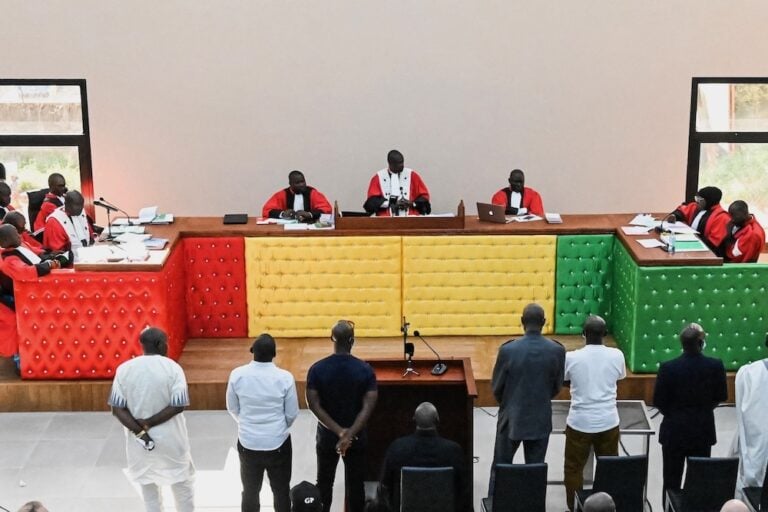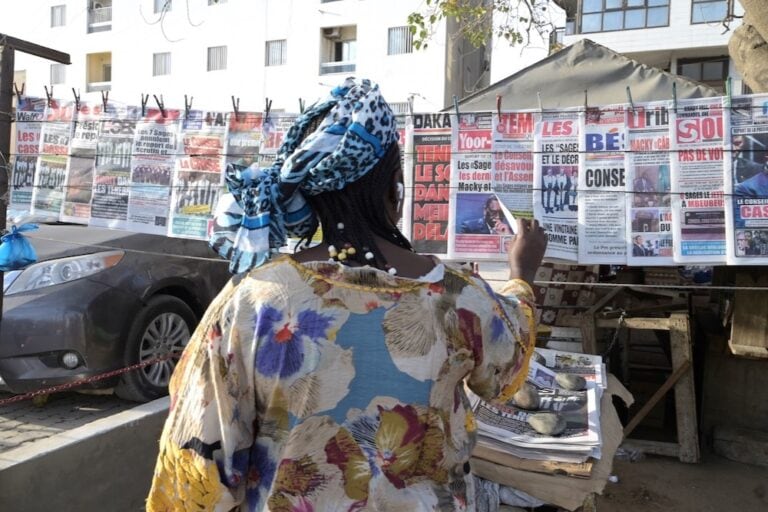(CPJ/IFEX) – In a 24 September 2001 letter to Senegalese President Abdoulaye Wade, CPJ expressed its deep concern over the increased harassment of Senegalese journalists by government authorities since President Wade took office in April 2000. The organization is particularly disturbed by the prosecution of Alioune Fall, editor-in-chief of the independent Dakar-based daily “Le Matin”, […]
(CPJ/IFEX) – In a 24 September 2001 letter to Senegalese President Abdoulaye Wade, CPJ expressed its deep concern over the increased harassment of Senegalese journalists by government authorities since President Wade took office in April 2000. The organization is particularly disturbed by the prosecution of Alioune Fall, editor-in-chief of the independent Dakar-based daily “Le Matin”, on charges of publishing false information.
Senegal has long been a model for press freedom in West Africa. Because of the respect that Senegalese authorities have generally shown the media in recent years, CPJ has not published a section on Senegal in its annual report on press freedom abuses around the world.
Last year, the Senegalese press played an important role in the elections that brought President Wade to power by reporting on minor irregularities in the polling. Thanks in part to this media scrutiny, the election was generally considered free and fair.
According to Senegalese sources, President Wade’s post-election call for more press freedom led local journalists to believe that authorities would repeal laws that allow journalists to be criminally prosecuted for their work.
That has not happened. Instead, President Wade’s government has aggressively harassed the local press. Fall’s prosecution is only the most recent and egregious in a string of violations committed by authorities during the last year and a half.
On 10 July 2001, Division of Criminal Investigation (DIC) agents apprehended and questioned Fall over an article in that day’s “Le Matin” about a police investigation into a recent riot at Dakar’s Central Prison. The article alleged that several prisoners had escaped due to police negligence.
“Le Matin” reported that the inquiry into the riot had been assigned to the gendarmerie instead of the police, who usually handle investigations in the city. The article also alleged that tensions had arisen between the two law enforcement agencies because of this inquiry.
During Fall’s detention, DIC officers tried without success to force him to reveal his sources. Fall was released after spending twenty-four hours in prison.
On 17 August, Fall was summoned to court, where the public prosecutor charged him with publishing false information, a criminal offense under Senegalese law. According to local sources, the journalist pleaded not guilty and maintained that his story was accurate.
Under Senegalese law, the burden of proof rests with the defendant. CPJ fears that Fall will thus be forced to compromise his sources in order to prove his innocence, something he has steadfastly refused to do.
The law under which Fall has been charged dates back to the French colonial era. And while Fall is the first Senegalese journalist whom President Wade’s government has actually brought to trial in a matter related to his work, CPJ has documented several other cases of media outlets that were threatened with prosecution under criminal defamation or state security laws.
On at least five occasions since President Wade took office last April, Senegalese authorities have used such statutes to arrest and interrogate journalists whose only “offense” appears to be reporting on sensitive issues. Among these issues are the conflict in the southern region of Casamance, where rebels have been fighting for independence for twenty years.
In July 2000, President Wade’s government charged the independent weekly “Le Temoin” with
publishing false news after the paper printed a story alleging that he had shouted at Mauritanian president Maaouya Taya during a phone conversation.
In August 2000, the government charged “Le Matin” with publishing false information likely to damage the army and public morale and threaten state security. The charges were based on an article in the paper about Casamance rebel troop movements. Senegalese sources reported that authorities interrogated Mama Less Camara, the newspaper’s publisher, after he publicly criticized the government’s decision to prosecute.
Senegalese authorities abruptly dropped all charges against both “Le Temoin” and “Le Matin” at the end of August 2000. It is not clear what prompted this decision.
In December 2000, then-prime minister Moustapha Niasse filed criminal defamation charges against the daily newspaper “Info 7” after the paper published an annotated draft of the new Constitution that allegedly contained critical notes by Niasse. Sources in Dakar say that although Niasse has not pursued the charges, the case has not been dropped.
Also in December 2000, police arrested and interrogated managing editor Theirno Talla and editor Sidy Diop of the daily “Le Populaire” about a recently published feature article on the Casamance conflict. Both journalists were later charged with “publishing false news and acts likely to cause public disorder.” The arrests came just ahead of peace talks between government officials and Casamance rebels (see IFEX alert of 14 December 2000).
Earlier that month, the government warned that “the moment peace talks are opened… any attack or conspiracy to attack national unity by broadcasting propaganda or spreading separatist views will result in legal action,” according to international news sources. The charges against “Le Populaire” were not pursued, according to sources in Dakar.
Recommended Action
Send appeals to authorities:
– expressing the view that journalists should never face criminal prosecution for their work
– recalling that journalists also have a widely recognized right to protect their sources, a practice that is integral to the media’s ability to gather information and report on issues of public concern
– urging him to ensure that the charges against Fall are immediately and unconditionally withdrawn
– urging him to do everything within his power to repeal criminal defamation statutes and other laws that criminalize journalism; to ensure that authorities cease harassing journalists; and to secure the right of journalists to protect their sources of information
Appeals To
Abdoulaye Wade
President of the Republic of Senegal
Avenue Leopold Sedar Senghor
Dakar, Senegal
Fax: +221 821 8660Please copy appeals to the source if possible.
For further information, contact Yv


